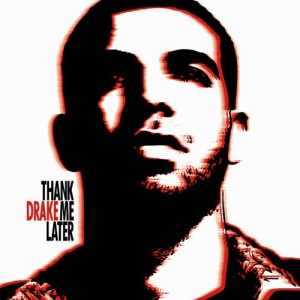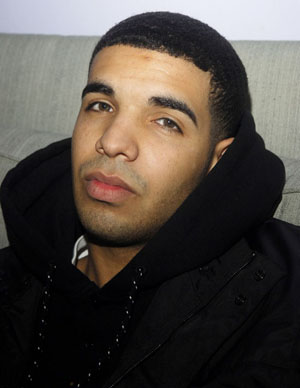
Drake
Thank Me Later
(Universal Motown; 2010)
By Chet Betz | 18 June 2010
I gotta hand it to Drake; I had no idea his ego was ready for a leap of this magnitude. Super-ego, in fact, kickin’ it in the rarefied air where Nas plays stand-in for Christ on an album cover and calls himself “God’s Son,” Jay-Z finds himself a nickname out of Jehovah, and Kanye, well, Kanye’s his own Jesus and Judas. Which doesn’t bode well for Drake since his trajectory propelled by id and fast success probably matches up closest to Ye. But whereas those predecessors, even Kanye, all found compelling ways to express their own self-importance, Drake kind of admirably flounders about within the limits of his terminology and the low ceiling of his artistry. Two of Drake’s favorite topics on Thank Me Later are “I’m young” and “I’m rich,” stated with precisely that level of eloquence and imagination; should we start calling him the Justin Bieber of rap? And to reiterate a point that Clay once touched upon:

Adhominemable, right?
Swizz Beatz appearing here with the beat for “Fancy” is appropriate; I’ve always thought of Swizz in similar terms to Scott Storch—that is, highly paid imitators, not innovators. Swizz had a bit of a Bangladesh fetish going on when he did Jay-Z’s “On to the Next One” and a Rich Harrison one when he did Beyonce’s “Get Me Bodied” and now Clay says “Fancy” makes him think of Swizz doing Black Milk. But like all Swizz productions, it’s a second-tier off of his inspiration, and I focus on Swizzle because what he does on the boards is pretty illustrative of what Drake does on the mic. Basically, Drake is a good faux-rapper. Lyrically, he’s a rapper of moments, both good and bad, as apt to the fleeting poignancy of a line like “You never see it coming / You just get to see it go” as he is to insipid self-absorption or pure cheese. He has a knack for catchy emphases and his flow’s okay but the act is as played out as it is accessible; dude’s an earnest but less purely talented understudy, the Lupe to Weezy’s Hov. There’s no better example of that than “Miss Me,” where Drake does a fine verse and then Lil Wayne does a verse that exposes it, like laminate floor running into gleaming hardwood. And if you want to draw the line more peer-to-peer and look at Lupe, well Drake’s like Lupe with half the IQ and twice the vices. I think many rap fans and blogerati would claim that this makes Drake more “interesting” than Lupe but in reality I think it just makes Drake more confused.
It’s quite a subtle confusion, though, as one thing Drake has that not many rappers have is killer “executive producer” instinct. There’s entrepreneurial inspiration in the way he turns Wayne’s hardcore iconoclasm into innocuous pop-rap, reminiscent of how Diddy bought himself Pharoahe Monch’s words and flow for Press Play (2006). And Drake seriously knows how to make an Album—how to pick beats, how to order everything so it flows well, etc. The troubling thing, then, is how cohesive this Album is when it comes to expressing what a douche its maker is. In this regard the ineptitude of other rappers at being coherent may be their saving grace.
Drake knows how to balance the fact that the more pop/R&B tracks on this record, as well used as they are in context, are a bit flaccid, like The-Dream without The-Dream’s onslaught of insidious vocal hooks—so, like a sandwich without the meat, and the sandwich is a fuckin’ Double Down. “Find Your Love” is horrible melted cheese. The-Dream actually shows up for “Shut It Down” so it’s too bad that at seven minutes long the track feels interminable. But then there goes Drake’s sequencing as “Shut It Down” is immediately followed by the record’s most winning stretch, “Unforgettable,” “Light Up,” and “Miss Me” all featuring nice beats (minus the unduly emphasized drums on “Light Up” which otherwise has an almost minimal El-P vibe going on with its primary synth loop) and incredible guest verses from Jeezy, Jay-Z, and Weezy, respectively. It’s in this record’s highlights, however, that its deepest flaw shines brightest. Drake is trying to be “Unforgettable,” hoping that ubiquitous “you” think of him and “the greatest” as synonymous. Prior to Hov jumping in with the most ridiculous-good opening bars from him in a minute, Drake plays up his martyr complex on “Light Up,” talking about how he’s slaving away making the music that his friends party to and then promising that he will always give us the real him, immutable, as if to respond to the accusing stares of neglected friends in “The Resistance.” And in “Miss Me” he tells us that we should miss him.
So while he’s more covert and even subversive about it than Nas and Hov and Kanyesus, Drake fully embraces being the center of his own universe and in so doing wishfully casts himself as that universe’s God. And in a way he’s much more fixated on that wish than his predecessors ever were, particularly in the cases of Nas and Hov who were just trying to position themselves as saviors of rap and rebel leaders born of the hood’s systemic oppression (well, and some Five Percenter teaching thrown in with Nas)—and for a long time doing so in contrast to each other. For Drake it’s all about him getting to live in the moment constantly, even as he yearns for something more lasting and for deeper connections with people. Drake’s solution to this dilemma is fucked. The first few bars of “Unforgettable” demonstrate Drake’s universe to be one where he can move with ease from a steady relationship to “bad bitches” even as he wants to keep fucking everyone he’s ever fucked and hopes that he’s constantly on the minds of the good girls left behind, a sentiment echoed in final track “Thank Me Now,” a parting retort that in turn shows the twisted temporality of Drake’s thinking as he desires now and forever now all the adoration and gratitude that he could ever receive for things he only thinks he’s already done or will maybe someday do.
As God, Drake projects his ephemeral and self-gratifying moment as the eternal moment, the eternities of everyone that he cares about only existing where their lives intersect with his. It’s a narcissist’s Nexus, and while there are martyr moments beyond “Light Up” in the hook of “Up All Night” and in “Fireworks,” each time Drake is kind of quietly underlining the obligation and need he imagines that others have for him, creating around himself a community of indenture that includes his “team,” his mother, his city, his lovers, partygoers, etc. I think only Weezy gets excluded from the condescension. And insofar as we make suppositions about the goings-on within the realm of Drake’s goofy mind, you have to feel bad for those folks that Drake clings to. His dream world is surely doomed. You could say that single “Over,” glorious beat on the hook and all, reveals the root of the downfall as Drake certainly seems to recognize at moments that his situation is sorta tragic—but dude’s such a slave to his appetites he treats that tragedy as inevitable instead of accepting the responsibility to change. Instead of redefining himself in order to better relate to the world, he chooses to imagine a world dependent on him as he is, doing as he does, Drake doing Drake. And that ship is going down. Pretty sad, pretty pathetic, pretty Drizzy.
But, and I’m sure this is reflective of Drake’s life itself, Thank Me Later is an album where its lethal shallowness presents a unified front, a kiddie pool where several modest pleasures and a few geysering highlights can be enjoyed as long as you don’t try to dive too hard into it or entertain the thought that there’s more than two dimensions at work. And as for its flawed central theme, Drake himself, well: Drake’s issues of identity and his all too cohesively declared selfishness is less good or bad for this album as a piece of music than it is a matter of whether you’re with Drake or you’re not. Drake here is virtually representational of a hedonistic idiom, his understanding of “living life right now” a paltry cliché. I harp on this because Drake claims profundity and sensitivity but has none of the substance of those qualities, only some of their conventional aesthetics in music and some lip service rendered empty by this Album’s backfiring cogency. I don’t buy into Drake because I don’t totally feel him but ultimately because I choose not to believe in him. If the critical sphere or music listeners in general choose to support Drake’s little theocracy, not only have we done nothing to help ourselves, but we’ve done nothing to help him. Idolize Drake? Let him self-deify, even? Thanks but no thanks.





